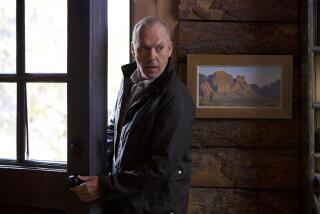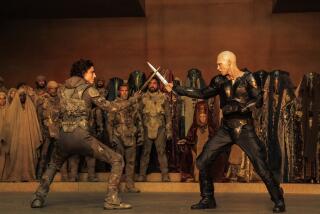From the Archives: ‘Star Trek IV: The Voyage Home’: From hubris to good humor
If most movies today are doomed to be sure-fire, presold properties--with ideas leached from our recent TV or cinematic past--let’s hope they’re all as good at the game as “Star Trek IV: The Voyage Home” (citywide).
Breathe there any non-Trekkies with hides so tough they won’t find something to enjoy in this rollicking, allegorical, super-space opera? Well, perhaps. But they’re likely to be outnumbered and outflanked. After a dubious start (loose ends to tie up from previous “Star Treks”), this movie settles down and takes hold.
It has an irresistibly sure touch, an easy command of its audience. It hits the right buttons, strikes the right chords, plays with our expectations with the right blend of savvy, guile and imagination. It’s reminiscent of an old trouper--a Chevalier, Hope or Crosby in their later years. Short of wind, it captures us with a wink or a word, a nudge on our mutual memory banks.
“Star Trek” itself has lasted so long--debuting on TV in September, 1966--that some of the original cast are beginning to look slightly long in the tooth, or broad of beam. But this movie may be a particular favorite of its special audience. If it lacks the dramatic fire, suspense and intensity of “Star Trek II” (the gem of the films so far), it also lacks the lugubrious pace of “Star Trek I” and the dolorous histrionics of “Star Trek III.”
In “Star Trek IV,” with Leonard Nimoy’s ineffable Vulcan, Spock, safely resurrected from his apparent demise, with the entire Enterprise crew reunited (though momentarily without the Enterprise), and with just a few minor difficulties left to contend with--simple trivia like courts-martial and the imminent destruction of Earth--there’s been a conscious attempt to lighten everything up.
We get a renewed infusion of a great quality of the TV series: the banter and byplay of the Enterprise crew. That early “Star Trek” was more endearingly small-scale, even visually hokey. When we saw “space: the final frontier,” it often resembled a blowup of an old Chesley Bonestell Galaxy magazine cover. The movies, made in the post-”Star Wars” era, became heavy on hardware, dwarfing the actors in cavernous sets and computer phantasmagoria. Here, the characters are pushed to the forefront: not as mythical heroes, but as individuals, with all their old charm, quirks--and tag lines.
The plot seems strained at first. The returning Enterprise crew finds the seas of Earth being vaporized by extra-terrestrial signals transmitted in a dead language. It is the song of the whale, exterminated by the thoughtless denizens of some earlier, more uncivilized Earth society. The solution: Travel back in time to 1986 San Francisco, save a few whales and bring them back. (As always, there’s an impossibly short amount of time--a day or two--to accomplish this.)
But the writers--including producer Harve Bennett and “Star Trek II’s” director Nicholas Meyer--haven’t made this didactic or overly coy. The main core is developed deliciously: the collision of values between the 23rd-Century explorers and that maddeningly primitive era, the late 20th Century.
Nimoy co-wrote the original story for this film, serving for the second time as director--and perhaps he’s responsible for the intimacy lavished on his old comrades. We get the old, crackling three-way badinage between the stolidly dedicated, inwardly tormented Kirk (Shatner), the stoically cerebral Spock (Nimoy) and the sarcastic gadfly Dr. “Bones” McCoy (DeForest Kelley). But here, McCoy is more humorously irascible than ever (the backwardness of 20th-Century medicine throwing him into a particular tizzy). Kirk--playing against Catherine Hicks’ scrumptious Bay Area marine biologist--has a welcome, softly bemused flirtatiousness. (Shatner seems completely recovered from “Star Trek III”, where his massive, tight-lipped woe sometimes suggested imminent birth--perhaps of a water buffalo.) Spock, back from the dead, is more himself than he has been since 1969--and funnier than you may ever recall him. His efforts to meld 20th-Century slang and profanity with Vulcan logical discourse are priceless.
And here, too, are privileged moments for the rest of the crew. The resourceful pilot Sulu (George Takei) puzzles over an antiquated helicopter. The voluptuous Uhura (Nichelle Nichols) stops some Frisco traffic. Russian-accented Chekhov (Walter Koenig) raises the eyebrows of a SFPD motorcycle cop as he asks for the location of “nuclear wessels.” And that bumptious, beaming engineer Scotty (James Doohan) copes with enough disasters to keep any miracle man busy.
The movie’s camaraderie and chuckling morality, combined with its elaborate trappings (Don Peterman’s gleaming cinematography, Leonard Rosenman’s emotional score) make it a genuine holiday treat. If it doesn’t touch the upper ranges of film science fiction--the stratosphere of “2001,” “Solaris,” “Stalker” “A Clockwork Orange” and “Blade Runner”--it’s still as good a modern-day “Star Trek” as we could have wanted. Modernly lavish, it keeps the qualities that won Gene Roddenberry’s series such remarkable loyalty. It tells a simple, humanistic allegory with humor and heart--and a wry touch of wonder that opens our eyes and, with a smile, beams us aboard.
More to Read
Only good movies
Get the Indie Focus newsletter, Mark Olsen's weekly guide to the world of cinema.
You may occasionally receive promotional content from the Los Angeles Times.






